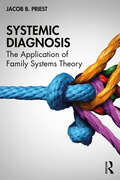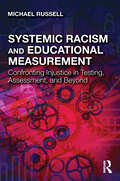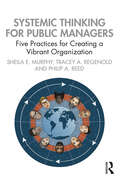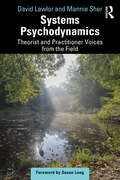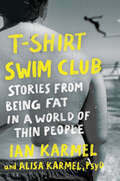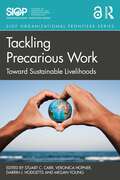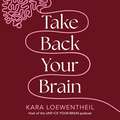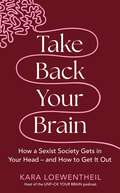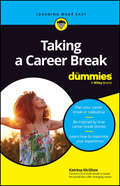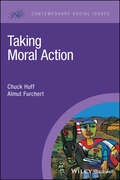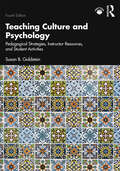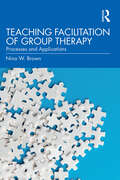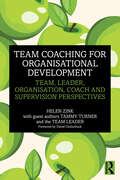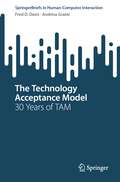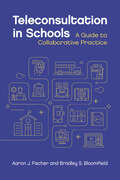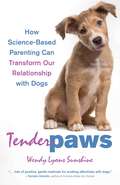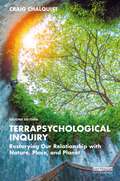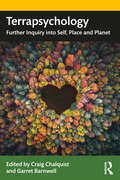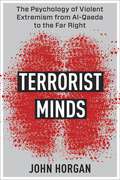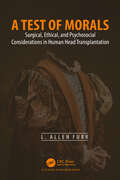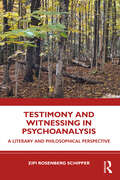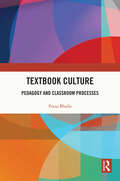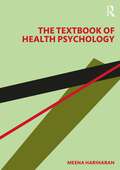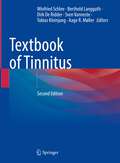- Table View
- List View
Systemic Diagnosis: The Application of Family Systems Theory
by Jacob B. PriestSystemic Diagnosis: An Application of Family Systems Theory helps marriage and family therapists incorporate theory-driven assessment and diagnosis into their practice, demonstrating how they can diagnose systems, not just individuals. This introductory textbook argues that theory and diagnosis are key to providing excellent care in family therapy. Rooted in family systems theory, Jacob B. Priest offers readers a model to diagnosis the history, structure, and boundaries of family systems. Chapters begin by looking at traditional and relational models of diagnosis before diving into systemic diagnosis. Readers are introduced to the EPIC assessment and guided on how to use it in their practice. Filled with case studies throughout, the book also includes digital content so students can practice a diagnosis process rooted in family systems theory. Designed to be used on COAMFTE accredited programs, this book is essential for couple and family therapy students who are taking courses in assessment and mental health diagnosis and treatment.
Systemic Racism and Educational Measurement: Confronting Injustice in Testing, Assessment, and Beyond
by Michael RussellSystemic Racism and Educational Measurement provides a theoretical and historical reckoning with racism and oppression produced through educational measurement and research methodology. As scholars and professionals in the testing, measurement, and assessment of human learning and performance work to exorcise race sciences, white supremacy, and other injustices from the field’s research and practice, new insights are needed into their root causes. This book is the first to posit that the theory of the White Racial Frame was and continues to be applied to the foundations, process, dissemination, and use of educational measurement, leading to instruments, findings, and decisions that perpetuate the racialized social structure of our nation. Even among well-meaning stakeholders who aim to improve humanity and address inequities, the White Racial Frame shapes the field’s research questions, the methods utilized, the data valued, the interpretations made, and the language used throughout. Students and scholars of educational measurement, testing, and psychometrics will find invaluable clarifications of terminology, concepts, and theories integral to understanding systemic barriers in the field; explications of educational measurement’s core purposes and its influence by the White Racial Frame; and a series of alternate frames, theories, and epistemologies intended to guide educational measurement toward anti-racism and increased fairness.
Systemic Thinking for Public Managers: Five Practices for Creating a Vibrant Organization
by Sheila Murphy Tracey Regenold Philip ReedOffering a pathway to vibrant organizations, this book integrates systems thinking, critical thinking, and design thinking, and provides the tools needed to proactively apply them in the social systems where we live and work. Systemic thinking—the combination of systems thinking, critical systems thinking, and design thinking—provides a way of addressing the complexity of problems faced by public sector managers. Far too often systemic thinking has been discussed theoretically rather than practically. This book changes that, enabling public sector managers and leaders to connect staff, partners, and stakeholders in the pursuit of thoughtfully designed and responsive service. Clearly written and designed to be put to immediate use on the job, each chapter provides a discussion of one specific practice. Included are guiding principles, a case study, relevant practical tools, and suggestions of for additional practice and reading.Using this book, managers of social systems such as public welfare, healthcare, public schools and libraries, housing and community development, and students of public administration will gain a deeper understanding of organizational systems and design, and a new toolkit to fortify their own organizations.
Systems Psychodynamics: Theorist and Practitioner Voices from the Field
by David Lawlor Mannie SherThrough a series of in-depth interviews with Tavistock thinkers across three generations, this volume illustrates the practice and application of the systems psychodynamics paradigm to organisational development consultancy, research and training. Across 28 stimulating interviews with a group of international consultants, interviewees present a critical appraisal of the systems psychodynamics paradigm and its application to present-day social and organisational difficulties. By using a narrative interpretive method, the interviewers attend to the historical, psychosocial and biographical dynamics of the interviewees’ approaches and methods of work, and address several areas of organisational consultancy. These include organisational design, the division of labour, levels of authority and reporting relationships; the nature of work tasks, processes and activities; primary tasks and the inevitable unconscious dynamics within systems and individuals. The multi-disciplinary approaches of the interviewees will interest managers, policymakers, consultant practitioners and researchers to understand the variety of applications of systems psychodynamics methodologies.
T-Shirt Swim Club: Stories from Being Fat in a World of Thin People
by Ian Karmel Alisa KarmelComedian Ian Karmel, with help from his sister, Dr. Alisa Karmel, opens up about the daily humiliations of being fat and why it&’s so hard to talk about something so visible.&“As charming and funny as it is poignant and thoughtful.&”—Roxane Gay, author of Hunger: A Memoir of (My) BodyIan Karmel has weighed eight pounds and he has weighed 420 pounds and right now he&’s almost exactly in between the two, but this book is not a weight-loss book. It&’s about being a fat person in a skinny world. It&’s about gym class and football practice, about chicken wings and juice cleanses, about airplane seats and roller coasters, about fat jokes and Jabba the Hutt, about crying in the Big and Tall section and the joys of being a sneakerhead, about prediabetes and gout, and about realizing that you actually don&’t want to eat yourself to death and hoping it&’s not too late.This book also includes a &“What Now?&” section from Ian&’s sister, Alisa, who herself cycled through so many fad diets that she eventually pursued a master&’s in nutrition and a doctorate in psychology with the goal of changing the contemporary narrative around fatness.Ian and Alisa Karmel grew up fat. As kids, they never talked about it. They were too busy fighting over the last SnackWell&’s Devil&’s Food cookie. Now, decades later, having both turned into fat adults who eventually figured out how to get their health under control, they are finally ready to unpack the impact that their weight has had on them.For them, the T-Shirt Swim Club is meant to be a place of support for anyone who struggles with weight issues. A place of care and candor, free of shame. A place to not deny or avoid the emotions you feel, the experiences you go through, the embarrassment, the anger, the resentment. T-Shirt Swim Club is about being a fat person and how the world treats fat people—but also an acknowledgment that maybe it doesn&’t always have to feel quite so lonely.
Tackling Precarious Work: Toward Sustainable Livelihoods (SIOP Organizational Frontiers Series)
by Stuart C. Carr Veronica Hopner Darrin J. Hodgetts Megan YoungTackling precarious work has been described by the United Nations (UN)’s International Labour Organization (ILO) as the main challenge facing the world of work. In this ground-breaking book, leading applied research scholars, advocates, and activists from across the globe respond to this challenge by showing how Industrial and Organizational (I/O) psychology has a significant contribution to make in humanity moving away from precarious work situations towards sustainable livelihoods. Broken down into four key parts on Sustainable Livelihoods, Fair Incomes, Work Security and Social Protection, the book covers a multitude of topics including the role of poor pay, lack of work-related security, social protection for human health and wellbeing, and interventions and policies to implement for the future of work. The volume offers a detailed look into useful and effective ways to tackle precarious work to create and maintain sustainable livelihoods. This curated collection of 22 chapters considers the broader relationships between previous research work and issues of human security and sustainability that affect workers, families, communities, and societies. Each chapter expands the present understandings of the world of precarious work and how it fits within broader issues of economic, ecological, and social sustainability. In addition to I/O psychologists in research, practice, service and study, this book will also be useful for organizational researchers, labor unions, HR practitioners, fair trade, cooperative, and civil society organizations, social scientists, human security analysts, public health professionals, economists, and supporters of the UN SDGs, including at the UN.
Take Back Your Brain: How a Sexist Society Gets in Your Head – and How to Get It Out
by Kara LoewentheilI never look good in skirts. I can't ask for a raise or my boss will think I'm greedy. I'm getting too old to find a partner. I'm a bad mom and my kids can tell. I'll never be good enough.Women absorb a lifetime of sexist social messaging that says our worth is determined by our looks, accomplishments, and what everyone (but ourselves) thinks of us. Take Back Your Brain exposes how the patriarchy hijacks our minds and wrecks our confidence-and shows how to break free once and for all.For a long time, Kara Loewentheil wasn't sure why she, like so many ambitious women, still wrestled with insecurity and low self-esteem, despite two Ivy League degrees, a successful law career, and a thriving social life. After breaking down under her desk one day, she decided enough was enough. Kara learned the power of thought work, became a Master Certified Life Coach, rewired her brain to overcome sexist social messages, and began to coach other women to do the same.Now in Take Back Your Brain, she shows you how to undo the socialisation you never asked for, starting with reprogramming your core beliefs from patriarchy's corrosive influence. Weaving cognitive psychology and feminist theory with practical thought work exercises, this book teaches you to:· Identify the conscious and unconscious biases that infiltrate your self-talk· Replace self-critical thoughts with new· Self-affirming beliefs· Embrace your emotions without fear of being seen as "too much"· Create new, empowered thought patterns around how you relate to your body, finances, and relationships· Stop relying on others for validation and start building self-confidence from withinBy changing your thoughts, you can transform your emotions, actions, the direction of your life, and ultimately the world. Because when women unleash their true power, they awaken new possibilities for all of us.
Take Back Your Brain: How a Sexist Society Gets in Your Head – and How to Get It Out
by Kara LoewentheilWhat if every time you had a self-critical thought, you heard it in a man's voice? The truth is not far off. Living in a patriarchy, women absorb a lifetime of messages that say your worth is defined by your looks, your accomplishments, and how well you take care of everyone around you. In fact, these messages are so pervasive that, even knowing they exist, they still manage to program themselves into our brains. The result is that women end up feeling anxious, guilty, and vaguely ashamed of themselves no matter how much they do for others or achieve for themselves. So how do we deprogram our thoughts from patriarchy's corrosive influence? And once we do, how can we create new, self-empowering beliefs? Master Certified Life Coach and host of the UnF*ck Your Brain podcast Kara Loewentheil knows how. Despite graduating from Harvard Law School and getting her dream job, Kara spent her twenties and thirties feeling insecure and anxious, until she learned how to change her thoughts. In Take Back Your Brain, she draws on cognitive psychology, feminist theory, and years of experience as a neuroplasticity-focused coach to break down how the patriarchy hijacks women's brains, and how women can get free. To bridge the gap between your inner voice and your true potential, she says, you must begin with your thoughts. By using the skills in this book to literally rewire your brain, you can create new thought patterns that will directly transform outcomes in your life. Ultimately, Take Back Your Brain invites you to replace the thoughts that no longer serve you and make room for a kind of confidence you never thought possible.
Taking A Career Break For Dummies
by Katrina McGheeTaking a career timeout could be the window of opportunity you’ve been looking for Taking A Career Break For Dummies shows you that a career break could be life-changing. Career breaks give us a chance to pause to identify opportunities and dreams, focus on the things we’ve been missing, and develop new skills. This book empowers you to take the leap into your next chapter. There are dozens of reasons you might want to do it, but whatever your circumstance, this friendly Dummies guide will help you value your own well-being, give yourself permission to grow and explore, and reclaim your time, your life, and your happiness. Develop your plan for taking a break from your career and for transitioning back when you’re ready Set a budget for your break, create a realistic timeline, and make it happen Access practical tools and resources to help you on your career break journey Build a positive mindset so you can enjoy your break and return to your career feeling renewedFor anyone looking for a new direction, feeling burned out, or longing to reignite that inner spark, Taking a Career Break For Dummies is a must. If you’re looking for help structuring your planned time off, you’ll also love the hands-on guidance and examples inside.
Taking Moral Action (Contemporary Social Issues)
by Chuck Huff Almut FurchertProvides a systematic framework for understanding and shaping moral action Taking Moral Action offers a timely and comprehensive overview of the emerging field of moral psychology, introducing readers to one of the most vibrant areas of research in contemporary psychology. With an inclusive and interdisciplinary approach, authors Chuck Huff and Almut Furchert incorporate a wide range of scholarly traditions, philosophical theories, empirical findings, and practical moral writings to explore the complex network of influences, contexts, and processes involved in producing and structuring moral action. Integrating key empirical and theoretical literature, this unique volume helps readers grasp the different aspects of both habitual and intentional acts of moral action. Thematically organized chapters examine moral action in contexts such as evolution, moral ecology, personality, moral identity and the self, moral reason, moral emotion, and more. Each chapter features a discussion of how neuroscience underlies or supports the influence and process addressed. Throughout the book, historical stories of moral action and examples of humanistic and experiential traditions of moral formation highlight what is possible, relevant, and appropriate in taking moral action in a variety of settings. Explores the relationships between moral psychology, empirical psychology, philosophy, and theology Considers the various ways that individuals experience and construct moral identity Emphasizes the practical application of the science of morality in service of moral good Reviews cultural, organizational, group, and social influences to investigate how individuals actively shape their moral environment Discusses the role of emotions in morality and considers if individuals can change or train their emotional responsesTaking Moral Action is essential reading for those new to the field and experienced practitioners alike. Containing extensive references and links to further readings, Taking Moral Action is also an excellent textbook for college and university courses in areas such as psychology, ethics, theology, philosophy, anthropology, and neuroscience.
Teaching Culture and Psychology: Pedagogical Strategies, Instructor Resources, and Student Activities
by Susan B. GoldsteinThe fourth edition of Teaching Culture and Psychology (previously Cross-Cultural Explorations) provides an array of carefully designed instructor resources and student activities that support the construction and implementation of courses on culture and psychology.Revised and expanded from previous editions, the book enables instructors to use selected activities appropriate for their course structure. Part One explores a variety of pedagogical challenges involved in teaching about culture and psychology and details specific strategies for addressing these challenges. Part Two (instructor resources) and Part Three (student handouts) center around 90 activities designed to encourage students to think critically about the role of culture in a wide range of psychology content areas. These activities are based on current and classic cross-cultural research and take the form of case studies, self-administered scales, mini-experiments, database search assignments, and the collection of content-analytic, observational, and interview data. For each activity, instructors are provided with a lecture/discussion module as well as suggestions for variations and expanded writing assignments. Student handouts are available in this text as well as on the Routledge website as fillable forms.Contributing to the inclusion of cultural perspectives in the psychology curriculum, this wide-ranging book enables instructors to provide students with hands-on experiences that facilitate the understanding and application of major concepts and principles in the study of culture and psychology, making it ideal for cultural psychology, anthropology, sociology, and related courses.
Teaching Facilitation of Group Therapy: Processes and Applications
by Nina W. BrownTeaching Facilitation of Group Therapy explores an extensive range of topics crucial to effective teaching and practice, and will be a valuable resource for instructors of group therapy. With an emphasis on evidence-based methodologies, this book describes proven teaching techniques that foster a dynamic learning environment, facilitate group cohesion, and promote meaningful interventions. The author presents ethical considerations including those that relate to using social media in therapeutic practices, equipping readers with the knowledge to leverage its potential while safeguarding client confidentiality and well-being. This resource presents topics including therapeutic factors and effective interventions, the use of the group leader’s inner development as a guide for therapeutic alliance and group members’ healing, cutting-edge therapeutic AI applications, the role of self-absorption for members and the leader, group dynamics, ethical uses of social media in therapeutic settings, and serves as a comprehensive guide for instructors in the art of teaching group psychotherapy in the modern era. This is an indispensable resource for educators to elevate their expertise in teaching group psychotherapy and prepare clinicians and students by deepening their understanding of group dynamics, and how to employ effective interventions that promote healing and growth in therapeutic settings.
Team Coaching for Organisational Development: Team, Leader, Organisation, Coach and Supervision Perspectives
by Helen ZinkWorking with teams, leading teams and being a member of a team is part of everyday working life for most of us. Through the lens of a team coaching case study, this book considers the development journey of a team and system influences over a three-year period. Readers are invited to walk in the shoes of the team, the team leader, the organisation, the team coach and the coach’s supervision and support networks, providing a unique insight into team coaching and development that goes beyond the traditional focus on the coach’s perspective. Helen Zink uses her considerable experience as a leadership and team growth coach, and leader to illustrate how team coaching interventions can be combined with other disciplines such as positive psychology, change management and strategic implementation in effective ways. The book takes a pracademic approach, showing how theories, models and best practice are applied to a real case and highlighting both the successes and challenges experienced to offer an example for all those involved in team, leadership and organisational development. With it widely recognised that collective leadership and teamwork is needed to deal with the rapidly changing environment organisations find themselves in, this is a timely and important resource for coaches, team coaches, coach supervisors, team leaders, team members, organisational development specialists, change managers, academics and consultants.
The Technology Acceptance Model: 30 Years of TAM (Human–Computer Interaction Series)
by Fred D. Davis Andrina GranićThis SpringerBrief discusses the origins, emergence, evolution, and future of the Technology Acceptance Model (TAM). TAM, simple yet powerful, has been extensively validated, standing as a leading scientific paradigm and a reliable model for explaining, predicting, and improving user acceptance across a spectrum of technological deployments. Over more than three decades since the introduction of TAM, numerous extensions have emerged, incorporating additional variables and collectively referred to as “TAM++”. However, perceived usefulness and perceived ease of use remain the basic beliefs of the core TAM model. The introductory chapter “Once upon a TAM” focuses on the challenging search for a user acceptance crystal ball, showing that it is indeed possible to consistently predict, explain, and improve user acceptance. “Evolution of TAM” traces the model's growth and adaptability, exploring the proliferation of selected TAM-related behavioural intention models, several integrated theoretical approaches, the quest for other behavioural intention antecedents, and TAM’s versatile applications in various contexts. “Revolution of TAM” presents an in-depth systematic review, encompassing a meta-analysis of selected TAM reviews and meta-analyses, and a narrative review of representative primary studies, providing a thorough and extensive understanding of the TAM universe. The epilogue “What will the Future of TAM be Like?” provides insights into its dynamic future. This SpringerBrief concludes with seven actionable principles, serving as a strategic guide for those aiming to customize the TAM++ body of knowledge for application-oriented studies within a particular context. This comprehensive overview of TAM is a valuable source of information for researchers, practitioners, and all interested readers, especially those new to the field.
Teleconsultation in Schools: A Guide to Collaborative Practice (Applying Psychology in the Schools Series)
by Aaron J. Fischer PhD Bradley S. BloomfieldThis practical guide to teleconsulting for school psychology professionals demonstrates how rapid advances in the field can help them expand support for educators, administrators, students, and their families by providing online access to consulting services. As schools adapt to teaching in the era of COVID and beyond, educators and school administrators have an increased need for consultation services via videoconferencing and other technologies. This book provides the first comprehensive introduction to how school psychology professionals can provide effective and culturally-sensitive teleconsultation. The authors describe a step-by-step consulting framework for building productive and collaborative relationships with educators, students, and families, and for troubleshooting any technical or client-related difficulties that arise. This framework includes building rapport with clients, identifying the presenting problem, developing and implementing treatment plans, and performing ongoing evaluations. Case examples illustrate each chapter, and a variety of online infographics are available as learning aids. The book concludes with a consideration of barriers to service, including accessibility, and considers the future promise of teleconsultation in schools.
Tender Paws: How Science-Based Parenting Can Transform Our Relationship with Dogs
by Wendy Lyons SunshineTender Paws takes a deep dive into the practical benefits of applying therapeutic parenting best practices to dogs in our care.When Wendy Lyons Sunshine got her first puppy—abandoned behind a gas station, struggling with worms and anemia—she was in over her head. As puppy training guides failed to help her with the out-of-control, traumatized bundle of teeth and claws rescue pup, she turned to her work helping world-class child development experts. Could strategies for raising happy, well-adjusted kids transfer to a puppy? As it turns out, yes, they can! From the first try, parenting wisdom transformed Sunshine&’s relationship with her challenging little one. Soon enough, Sunshine&’s view of her puppy shifted from one of adversity to one of compassion and understanding, and she was able to bring patience and therapeutic concepts to meet her dog&’s needs. When Sunshine reached out to experts, they affirmed that science-based principles used with at-risk children align well with best practices of holistic, positive, and progressive dog handling. Exploring parallels between human and canine research, attachment styles, history of trauma, parenting styles, and her own &“inner child&” proved a mindful path for pet parenting. Far from a standard dog training manual, Tender Paws explicitly applies parenting wisdom and best practices used with special needs kids to a cross-section of scenarios, from recognizing developmental trauma and unmet core needs, to making decisions about appropriate equipment, to responding to difficult behavior, to understanding the parenting style from which we approach our dogs. Sunshine empowers you and your dog by offering: A synthesis of the fields of child development, attachment, trauma, sensory integration, neurobiology, learning, animal behavior, and ethology. A problem-solving framework that makes dog training decisions clearer and behavior frustrations easier to resolve. Parenting wisdom to help your dog move beyond trauma and into wellness. Borrowing the principles of parenting for dogs feels obvious to some people: instinctive and ordinary and inevitable. But that&’s not true for everyone, especially those of us who had a less than ideal childhood and bear the scars of early harm, loss, trauma, or deprivation. Tender Paws provides an interdisciplinary, comprehensive, evidence-based guide for readers who want to honor the needs of—and improve outcomes for—puppies and dogs they care about.
Terrapsychological Inquiry: Restorying Our Relationship with Nature, Place, and Planet
by Craig ChalquistTerrapsychological Inquiry is a path of storied, imaginative research that takes seriously our intense inner responses to the state of the natural world. This place-rooted approach studies, from the standpoint of lived experience, how the world gets into the heart. Oceans and skies, trees and hills, rivers and soils, and even built things like houses, cities, ports, and planes: How do they show up for us inwardly? How do our moods, feelings, and dreams reflect what happens in the world? Terrapsychological Inquiry evolved over a decade of exploration by graduate students, instructors, ceremonialists, workshop leaders and presenters, and other practitioners of embodied creativity to offer an Earth-honoring mode of storied qualitative inquiry, one that transforms all involved from passive spectators of the doings of the world into active, sensitive participants. Learn how to use this methodology of earthly reenchantment in a variety of settings inside and outside academia and by doing so reenter an animate world. This new edition has been revised throughout and offers fresh insights into how Terrapsychological Inquiry, a field with roots in depth psychology, ecopsychology, and Hermetic philosophy, can also be used as an ecospiritual path. Thoroughly updated with a new chapter and added discussion questions and exercises at the end of each chapter, this introduction to an evolving research methodology will be of great interest to students and scholars of environmental psychology, ecotherapy, and environment and sustainability studies more generally.
Terrapsychology: Further Inquiry into Self, Place and Planet
by Craig Chalquist Garret BarnwellReflecting on and exploring the connection between the environments in which we live and our moods, motivations and dreams, this insightful volume takes the growing field of terrapsychology into new and exciting directions. This book draws together a group of contemporary voices in terrapsychology to explore lived topics, such as ecotransference encountered with sacred place, alternative mapping and expressions of solidarities with sacred sites, place dreaming, locianalysis, trans-species encounters, deep genealogy, terraplomacy and Hermeticism. The chapters focus on praxis, demonstrating how each author’s relationship with the more-than-human world has been reenchanted, revealing, remembering and co-creating relationships and community for life to flourish. Co-edited by Craig Chalquist and Garret Barnwell this collection will interest scholars, students and practitioners across a range of fields, including analytical psychology, environment psychology, and cultural anthropology.
Terrapsychology: Further Inquiry into Self, Place and Planet
by Craig Chalquist Garret Barnwell- The place of nature and environment is increasingly recognized in therapeutic theory and practice. - Co-edited by the originator of the theory of Terrapsychology. - Builds on his successful 2020 title, Terrapsychological Inquiry, which we also published.
Terrorist Minds: The Psychology of Violent Extremism from Al-Qaeda to the Far Right (Columbia Studies in Terrorism and Irregular Warfare)
by John HorganWhat makes a person want to become a terrorist? Who becomes involved in terrorism, and why? In what ways does participating in violent extremism change someone? And how can people become deradicalized?John Horgan—one of the world’s leading experts on the psychology of terrorism—takes readers on a globe-spanning journey into the terrorist mindset. Drawing on groundbreaking personal interviews as well as decades of research from psychologists and others, he traces the pathways that lead people into violent extremism and explores what happens to them as their involvement deepens. Horgan provides an up-to-date, evidence-based understanding of the patterns, motives, and mentalities of violent extremists from the Islamic State and al-Shabaab to white supremacists and incels. He argues that there is not a straightforward psychological profile of a terrorist, in part because of the great variety of today’s extremists, who are able to attract a more diverse pool of recruits than ever before. But even though there is no one-size-fits-all profile, psychological study can provide crucial insight into why and how people become terrorists.Accessible and nuanced, Terrorist Minds is an essential book for readers interested in what psychology can explain about extremist behavior.
A Test of Morals: Surgical, Ethical, and Psychosocial Considerations in Human Head Transplantation
by L. Allen FurrWhile transplanting human heads is not a new concept, the idea has largely been relegated to religious lore or as a plot device in science fiction. But now, a surgical plan to perform the complex procedure exists, and though most physicians question head transplantation’s medical veracity, bioethicists have challenged the surgery on moral grounds. A Test of Morals compiles and examines the ethical questions that dog those who advocate for conducting this most radical of medical proposals in order to determine if society should move forward and allow head transplantation to occur. Current bioethical principles stand in opposition to head transplantation, causing a conflict of values rarely seen in medicine.
Testimony and Witnessing in Psychoanalysis: A Literary and Philosophical Perspective
by Zipi Rosenberg SchipperIn this fascinating volume, Zipi Rosenberg Schipper approaches the fundamental topic of testimony, seeking to recognize its value as a distinct and vital function in psychoanalytic work, separate from its inherited importance to work on trauma. Rosenberg Schipper introduces a revivifying philosophical, linguistic and psychoanalytic approach to the act of testimony, focusing on the role of witnessing in daily life and the importance it has as a therapeutic tool in psychoanalytic and psychological therapy. Throughout, she pinpoints three key psychoanalytic theories on patient testimony. She begins by looking at Freud’s foundational work on testimony as a means of concealing the unconscious and the questions of credibility in the consulting room this creates before looking at Winnicottian and Kohutian theories, whereby therapists take everything the patient says as a definitive truth. She concludes by looking at the Intersubjective and Relational schools of thought, where the therapist assumes the role of witness. By providing a comprehensive overview of the conflicting theories on the topic, Rosenberg Schipper equips practicing psychoanalysts and analysts-in-training with the tools necessary to utilize this vital therapeutic device and engage with it in treatment for all patients.
Textbook Culture: Pedagogy and Classroom Processes
by Pooja BhallaThis volume captures the essence of schooling in a structural manner and explores the classroom life in the larger schooling context. The emphasis is to uncover the necessary framework of classroom that is significant to understand the place of textbooks in the Indian school education system. By the use of ethnographic vignettes, it brings out the multiple patterns of teacher- student's interactions as they occur in different textbook-based situations. Through this, it sheds light on the primacy of the textbook approach in the classroom processes.The book also investigates the ways through which the students respond to the different pedagogic situations. In doing so, it explores the notions of student boredom, alienation, inclusion and exclusion, and the array of student-textbook experiences that are pivotal to the shape and reshape the classroom processes in the larger pedagogical discourses.This book will be of interest to researchers, students, and teachers of education studies, sociology and politics of education, teacher education, childhood and youth studies, and urban studies. It will also be useful for education policymakers, and professionals in the development sector.
The Textbook of Health Psychology
by Meena HariharanThis book examines the concept of health psychology following its trajectory from ancient to contemporary times. It analyses the theories, practice and research in health psychology from both Indian and Western perspectives. The volume brings together knowledge diversified across various narrow subfields. It expounds upon physiological psychology; chronic illnesses associated with physiological systems; and biopsychosocial approaches to treatment and management with therapeutic interventions integrated throughout the book. It further discusses health promotive and health risk behaviour with reference to health policies and databases at national and global levels. This book will be beneficial to the students, researchers and teachers of psychology, applied psychology, public health, public policy, community health, and medical and paramedical studies. It will also be indispensable to the policy-makers and NGOs working in the field of public health.
Textbook of Tinnitus
by Winfried Schlee Berthold Langguth Dirk De Ridder Sven Vanneste Tobias Kleinjung Aage R. MøllerThis book describes the theoretical background of the different forms of tinnitus (ringing in the ears) and detailed knowledge of state-of-the-art treatments of tinnitus. Tinnitus has many forms, and the severity ranges widely from being non-problematic to severely affecting a person’s daily life. How loud the tinnitus is perceived does not directly relate to how much it distresses the patient. Thus, even tinnitus very close to the hearing threshold can be a disabling symptom. It can reduce the quality of life by generating anxiety and concentration problems, impairing the ability to do intellectual work, making it difficult to sleep, causing depression and sometimes even leading to suicide.Textbook of Tinnitus has filled a void by providing a comprehensive overview about the different forms of tinnitus, their pathophysiology and their treatment. However, since the publication of the first edition of the Textbook of Tinnitus in 2011, tinnitus research has dramaticallyevolved. In view of the substantial increase in knowledge, most chapters in this second edition are newly written and a few original chapters have had major updates. This edition has nine sections, covering the basics of tinnitus, the neurobiology of tinnitus, pathophysiological models, animal research, diagnosis and assessment, various forms of management and treatment, and finally, a look at the future of tinnitus and tinnitus research. The book will be of great interest to otolaryngologists, neurologists, psychiatrists, neurosurgeons, primary care clinicians, audiologists and psychologists, and students. Because of its organization and its extensive subject index, Textbook of Tinnitus, Second Edition can also serve as a reference for clinicians who do not treat tinnitus patients routinely.
